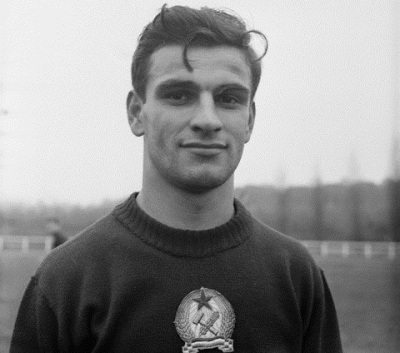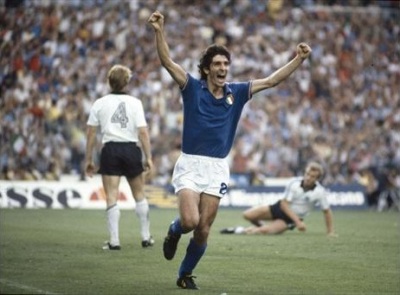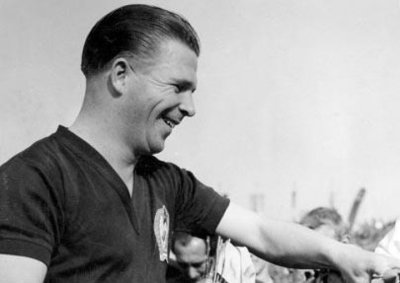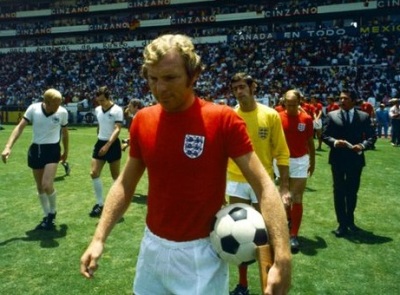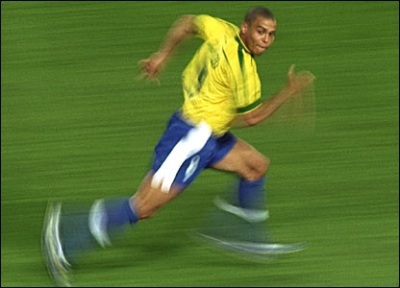Retro World Cup: let them entertain you ~ the 30 greatest ever World Cup players
Pitch perfect: the soccer superstars of lore in this heroes’ gallery all make it into this post’s World Cup top 30 rundown, but is its numero uno among them? (Image credit: Daniel Nyari)
Here we are then. World Cup final day, at last. But, wait a tick, this isn’t 1986, is it? Or 1990? No, folks, it is indeed 2014 and, yes, it is Germany versus Argentina. Again. If you’re anything like me, you may not be looking forward to this final this time out quite as much as you have others; the third time these two nations have met each other in the climax to football’s quadrennial showpiece. I mean, it’s hardly a triumph for variety, is it?
Unlike, if I may be so bold, this post is. For, yes, in celebration of today marking the conclusion of the most goal-happy, most surprising, most exciting and – genuinely – the most entertaining World Cup in at least 20 years, I’ve decided to conclude this blog’s season of World Cup posts by rather painstakingly putting together my rundown of the very best players to have graced every edition of the thing. Using a rating system described below, it ranks every footballer – from 30th down to 1st – according to the number of matches they played; the number of goals they scored; the number of times they reached later stages of tournaments (and which later stages); the number of tournaments they won and, most important of all, the amount of singular talent they possessed.
So, if you will, folks, please take a few moments and indulge me; pass your peepers over this labour of love dedicated to the ‘special ones’ of soccer lore. Trust me, it shouldn’t take you as long as watching a knockout-round tactical-mine-field-of-a-match going the full 90 minutes, plus extra-time and, of course, the dreaded penalty shoout-out. Well, hopefully it won’t, anyway…
.
.
Key to symbols:
 Football talent
Football talent
(Maximum ‘football talent’ available 30 pts/ 1-30 pts)
 Total World Cup match appearances
Total World Cup match appearances
(1-9 World Cup matches = 1pt/ 10 or more World Cup matches = 2pts)
 Total goals scored in all World Cups
Total goals scored in all World Cups
(1-4 goals scored = 1 pt/ 5-9 goals scored = 2 pts/ 10 or more goals scored =3 pts)
 Total World Cup quarter final appearances
Total World Cup quarter final appearances
(Each quarter final appearance = 1 pt)
 Total World Cup semi-final appearances
Total World Cup semi-final appearances
(Each semi-final appearance = 1 pt)
 Total World Cup final appearances
Total World Cup final appearances
(Each final appearance = 1 pt)
 /
/  Total World Cups won
Total World Cups won
(Each World Cup won = 1 pt)
.
.
CLICK on each player’s name for a bonus video clip
.
.
.
30. Sándor Kocsis
Nation: Hungary
Position: Forward (classic shirt number: 8)
World Cups: Switzerland 1954
The lowdown: The figurehead of the ‘Magnificent Magyars’, the outstanding Hungary side of the ’50s (yes, the one that was the first ever team to beat England at Wembley), Kocsis shook the world at the ’54 tournament by scoring an incredible 11 goals in five appearances. He’d be overtaken at just the next World Cup as its highest ever scorer, but a full 60 years on from his exploits he still possesses the best goal-to-game ratio (2.2) of multiple World Cup goalscorers.
The abiding memory: Netting a double hat-trick (against South Korea and West Germany) – the first man to do so in World Cup history
Strange but true: After defecting to the West in ’56, Kocsis played for Barcelona along with fellow ex-‘Magnificent Magyar’ Zoltán Czibor; both of them played in the ’61 European Cup final against Benfica held at the same stadium as the ’54 World Cup final, in which they’d both scored – in this match they both scored again and lost the match, again, 3-2
.
.
.
27. [1] Teófilo Cubillas
Nation: Peru
Position: Forward (classic shirt number: 10)
World Cups: Mexico 1970; Argentina 1978; Spain 1982
The lowdown: Affectionately nicknamed ‘The Pelé of Peru’, Cubillas was a diminutive dynamo in the white (and that ace red diagonal stripe) of Peru, an outstanding ‘second striker’ whom boasted terrific technique and a marvellous knack of scoring from direct free-kicks. He netted five times each at two World Cups held eight years apart (’70 and ’78) and was named ‘Young Player of the Tournament’ at the first.
The abiding memory: A sublime free-kick strike with the outside of his foot against Scotland in ’78 that bent the ball round the wall and into the top corner
Strange but true: While playing in a 1981 match for Fort Lauderdale Strikers (alongside George Best) against Los Angeles Aztecs, he scored a hat-trick in seven minutes
.
.
.
27. [2] Dino Zoff
Nation: Italy
Position: Goalkeeper (classic shirt number: 1)
World Cups: West Germany 1974; Argentina 1978; Spain 1982
The lowdown: Sure, both the USSR’s Lev ‘The Black Spider’ Yashin and England’s Gordon Banks may technically have been better goalkeepers, but the reason Zoff’s on this list is that in ’82, hardly tub-thumping but a cool, calm customer, he became the first ’keeper to captain a World Cup winning-side in modern times – beating Spain’s Iker Casillas to that honour by 30 years. He was also Italy’s ‘Number 1’ for a decade and went on to manage them.
The abiding memory: Surrounded by jubilant teammates, Zoff serenely lifting the World Cup trophy in triumph
Strange but true: He holds the record for going the longest period of time without conceding a goal at multiple international tournaments (1,142 minutes between ’72 and ’74)
.
.
.
27. [3] Gheorghe Hagi
Nation: Romania
Position: Attacking/ left midfield (classic shirt number: 10)
World Cups: Italy 1990; USA 1994; France 1998
The lowdown: ‘The Maradona of the Carpathians’, Hagi lit up the ’94 tournament, in particular; indeed, Brazil’s Romario won that year’s ‘Golden Ball’, but the best on show was surely the Romanian playmaker par excellence. Hagi had everything; excellent technique, passing, finishing and vision. He captained his nation to the last eight in ’94, including a terrific 3-2 victory in the ‘Last 16’ round over Argentina.
The abiding memory: The goal he scored out of nowhere against Colombia in the ’94 group stage, curling the ball into the net as he lobbed the keeper 40 yards out from the left side
Strange but true: More sad and true – at the end of the ’80s, Hagi was prevented from joining both AC Milan and Bayern Munich because Romania’s then Communist regime wouldn’t let him leave the East; eventually, however, he’d play for both Real Madrid and Barcelona
.
.
.
24. [1] Just Fontaine
Nation: France
Position: Forward (classic shirt number: 17)
World Cups: Sweden 1958
The lowdown: The highest scorer in a single World Cup, the small, squat 24 year-old Fontaine put four past defending champions West Germany in ’58’s third/ fourth place play-off to top-off a staggering tournament tally of 13 goals. Although having only played in one tournament (six matches), he still stands fourth on the all-time World Cup scorers’ charts – and, overall, bagged a total 30 goals in 21 international appearances.
The abiding memory: That double-brace against France’s old rivals the West Germans
Strange but true: Before the tournament, Fontaine had scored just one international goal in 53 months and, throughout it, he actually wore a teammate’s borrowed boots
.
.
.
24. [2] Geoff Hurst
Nation: England
Position: Forward (classic shirt number: 10)
World Cups: England 1966; Mexico 1970
The lowdown: England’s World Cup hero for all-time thanks to his three goals defeating West Germany in the hallowed ’66 final on home soil, Hurst remains the only man to have scored a hat-trick in a World Cup final – a feat which, on its own, would surely secure him a place in the pantheon of the precious soccer prize-seekers’ greatest
The abiding memory: “They think it’s all over… it is now” – blasting that ball into the top corner to make it 4-2 and win England the Cup
Strange but true: Despite his incomparably heroic exploits, Hurst had earned so little money as a footballer that, when he retired from the sport, he became an insurance salesman
.
.
.
24. [3] Grzegorz Lato
Nation: Poland
Position: Right-winger/ forward (classic shirt number: 16)
World Cups: West Germany 1974; Argentina 1978; Spain 1982
The lowdown: After notoriously qualifying for the ’74 World Cup at the expense of England, Poland surprised, well, everyone by excelling at the tournament itself (finishing a terrific third), thanks in no small part to the seven goals scored by ace marksman Lato, which also secured him that year’s ‘Golden Boot’. Strictly speaking not an out-and-out striker, his awareness, acceleration and shot were his weapons, helping his nation to third place again in ’82.
The abiding memory: Netting the only goal against World Cup holders Brazil in ’74’s third/ fourth place play-off tie
Strange but true: Between 2001 and ’05, he served as a senator for Poland’s Sojusz Lewicy Demokratycznej (Democratic Left Alliance); since 2008 he’s been Chairman of the Polish FA
.
.
.
20. [1] Uwe Seeler
Nation: West Germany
Position: Forward (classic shirt number: 9)
World Cups: Sweden 1958; Chile 1962; England 1966; Mexico 1970
The lowdown: Before Völler, Klinsmann and both the Müllers came Seeler, a four-time World Cup-appearing West German goal-getter as dependable as a BMW. His record of nine nettings has been bettered by others on this list, but the short, stocky striker remains the only man to have scored at least twice in four separate tournaments and currently ranks fourth on the list of total minutes played at the competition (behind Italian Paolo Maldini and compatriot Lothar Matthäus) with 1,980. He also captained his nation at the ’66 and ’70 editions.
The abiding memory: Probably shaking hands with England skipper Bobby Moore at the start of the ’66 final – the only one in which he played
Strange but true: He was the first man to score at four different World Cups – beating Pelé to the honour by mere moments
.
.
.
20. [2] Paolo Rossi
Nation: Italy
Position: Forward (classic shirt number: 20)
World Cups: Argentina 1978; Spain 1982
The lowdown: The World Cup’s ultimate ‘zero to hero’, Rossi was the scrawny-looking striker (having just returned from a two-year match fixing scandal-related ban) whom was so inept in Italy’s opening three games at the ’82 tournament, he was described by a journalist as ‘a ghost aimlessly wandering over the field’. However, like his team, he was transformed into an irresistible, opportunistic tour de force in a do-or-die tie against Brazil, scoring a hat-trick to see Italy into the semis. Ultimately, he ended up winning the Cup, the ‘Golden Boot’, the ‘Golden Ball’ and the European and World Player of the Year Awards.
The abiding memory: His perfectly poached hat-trick against Brazil in that unforgettable match that put the Azzurri through and the Seleção out
Strange but true: Rossi’s rise to greatness is even more remarkable when one considers he also overcame injuries early in his career that required three separate knee operations
.
.
.
20. [3] Sócrates
Nation: Brazil
Position: Attacking midfield (classic shirt number: 8/ 18)
World Cups: Spain 1982; Mexico 1986
The lowdown: A football legend unlike any other, Sócrates might as much deserve his place in this rundown for who he was as for what he did. Tall, lanky and lazily handsome, he was the chain-smoking, heavy-drinking political activist whom also happened to be one of the greatest footballers of his generation, captaining the marvellous ’82 Brazil side (in a sort of double playmaker role with Zico – yes, the Brazil of ’82 was that wonderful) to glorious defeat at the second group stage thanks to their lack of defence. Blessed with terrific vision and finishing ability, his trademark move was the blind-heel-pass.
The abiding memory: That fantastic goal he smashed past Dino Zoff at his near post in ’82’s fabulous Brazil-Italy encounter
Strange but true: He really did earn a doctorate in medicine while still a professional footballer (although not in Dublin as rumour would have it) and practiced after his sporting career; his younger brother Raí was Brazil’s initial captain at the ’94 World Cup, which they won
.
.
.
20. [4] Gary Lineker
Nation: England
Position: Forward (classic shirt number: 10)
World Cups: Mexico 1986; Italy 1990
The lowdown: Easily the UK’s highest scorer at the World Cup and the ‘Golden Boot’ winner at the first of his two tournaments, the modern-day anchor of the Beeb’s Match Of The Day was, way back when, absolutely lethal in the six-yard box – and also a decent footballer with a cute touch (as his performances in England’s much improved later Italia ’90 games attest). England’s undisputed football hero throughout the ’80s and early ’90s, he retired from international duty after 80 matches, just one goal short of Bobby Charlton’s record goal haul of 49.
The abiding memory: That late, late equaliser against the West Germans in the ’90 semi-final is very special, but his glorious hat-trick against the Poles in ’86 is truly unforgettable
Strange but true: So talented at sport was the young Lineker, it’s said he could have made it as either a professional cricketer or a professional snooker player, had he not chosen football
.
.
.
18. [1] Ferenc Puskás
Nation: Hungary/ Spain
Position: Forward (classic shirt number: 10)
World Cups: Switzerland 1954; Chile 1962
The lowdown: Heralded one of the greatest players of all-time, Puskás was captain of the ’50s Hungary team. Thanks in no small part to his ability, grace and goals, they reached the final at the ’54 World Cup – only to great surprise to be beaten by West Germany, although decades later Puskás was retrospectively awarded that tournament’s ‘Golden Ball’. After 85 matches for Hungary (scoring 84 goals), he defected to the West and joined Real Madrid. Eventually adopting Spanish nationality, he played for the country three times in the ’62 tournament.
The abiding memory: Playing in the ’54 final despite having endured a hairline fracture to his ankle earlier in the tournament
Strange but true: The party-loving Puskás only knew two words in English: ‘drink’ and ‘jiggy’
.
.
.
18. [2] Gérson
Nation: Brazil
Position: Central midfield (classic shirt number: 8)
World Cups: England 1966; Mexico 1970
The lowdown: Hailed as ‘the brain’ behind Brazil’s legendary ’70 World Cup triumph, Gérson’s importance may be a little overstated by his many admirers, but there’s no doubt he was an important influence on that side, dictating play in midfield and launching defence into attack with raking balls forward. He was also arguably the best player in the ’70 final, in which he scored.
The abiding memory: Brazil’s second goal of that final (and his only of the tournament), a cracking shot with his powerful left foot
Strange but true: As the ’70s progressed, Gérson’s name became a controversial byword for the traditional Brazilian stereotype of disregarding laws and authority thanks to him declaring in a much seen cigarette commercial: “I like to take advantage of everything”
.
.
.
16. [1] Eusébio
Nation: Portugal
Position: Forward (classic shirt number: 13)
World Cups: England 1966
The lowdown: Sure, Eusébio didn’t score as many goals in his sole World Cup as Just Fontaine or Sándor Kocsis did in theirs, but coming nearly a decade after them, it’s only fair to say that by the ’66 World Cup defensive play had improved (see Bobby Moore’s entry below); thus, it was becoming increasingly difficult to score a ludicrous number of goals in a single tournament. But Eusébio certainly did; verily living up to his nickname ‘The Black Panther’ by cracking in nine in just six matches. Prior to, during and after the tournament he was always uncannily lethal in front of goal (749 goals in 743 domestic games; 41 in 64 internationals); a deserved winner of ’66’s ‘Golden Ball and, of course, ‘Golden Boot’ awards then.
The abiding memory: Dragging Portugal back from the brink against über-minnows North Korea in the ’66 quarter final and putting them in the ‘last four’ by scoring four times, transforming a 0-3 scoreline into 4-3
Strange but true: Eusébio’s early years were so impoverished that, as a teenager, he played football barefoot with a local team he’d formed using balls made of socks stuffed with newspapers
.
.
.
16. [2] Jürgen Klinsmann
Nation: (West) Germany
Position: Forward (classic shirt number: 18)
World Cups: Italy 1990; USA 1994; France 1998
The lowdown: The current coach of the United States (or USMNT, if we’re going to get all acronymical about it like the Yanks do) may not strike one as a World Cup great, but his record absolutely speaks for itself. Eleven goals in 17 matches across three World Cups – and at least three quarter-finals reached with far from a great team in his latter two tournaments, at that. He’s also the only man to have scored three or more goals at three consecutive World Cups.
The abiding memory: Following his strike partner Rudi Völler getting idiotically sent-off early in the 1990 second round tie against the Netherlands, playing the rest of the match as a lone striker to perfection, pulling the Dutch defence all over the place – and, yes, inevitably scoring against them
Strange but true: Born into a family of bakers, Klinsmann’s parents only allowed him to pursue a career in football after he’d served his apprenticeship in his dad’s bakery
.
.
.
15. Bobby Moore
Nation: England
Position: Centre-back (classic shirt number: 6)
World Cups: Chile 1962; England 1966; Mexico 1970
The lowdown: The only out-and-out defender on this list, Moore has been acclaimed by many (not least Pelé) as the best there’s ever been; his positioning, anticipation, ease on the ball and distribution ensuring he was decades ahead of his time – and arguably better than the vast majority of today’s centre- and full-backs too. Critically as well, of course, he captained his country to World Cup glory (at the tender age of 25) and led England to the last eight at Mexico ’70, as well as playing in all four of England’s Chile ’62 matches.
The abiding memory: Smiling as wide as the King’s Road as he received the Jules Rimet trophy from The Queen and hoisted it high
Strange but true: The Bobby Moore Fund, the charity set up by his widow, has (as of February 2013) raised £18.8m for research into bowel cancer, from which Moore died in 1993
.
.
.
13. [1] Jairzinho
Nation: Brazil
Position: Forward/ right and left midfield (classic shirt number: 7)
World Cups: England 1966; Mexico 1970; West Germany 1974
The lowdown: One of the greatest players in the truly great ’70 Brazil side, Jairzinho is remembered as a legend for scoring at least one goal in every match his nation played there – not least because he wasn’t a striker at all, but a winger with terrific strength, balance, vision, dribbling skills and an awesome shot. Nicknamed Furacão (‘The Hurricane’) following his Cup-winning and -scoring exploits, he actually turned out for Brazil in the previous tournament and in ’74 too, where he added two further strikes to his total goal tally.
The abiding memory: Given all the goals he scored in the ’70 tournament, there’s much to choose from here, but for me it’s got to be the one he notched against Uruguay in the semi-final, a terrific team goal resulting from a marvellous move he started himself in the Brazilian half
Strange but true: Jairzinho claims he received a ‘Best Body on the Planet’ prize at the ’70 World Cup; unsurprisingly FIFA have never corroborated its existence, let alone its award
.
.
.
13. [2] Lothar Matthäus
Nation: (West) Germany
Position: Central/ attacking midfield/ sweeper (classic shirt number: 10)
World Cups: Spain 1982; Mexico 1986; Italy 1990; USA 1994; France 1998
The lowdown: A far-more-than-decent midfielder and spot-kick specialist, Matthäus may not have been among the very best to have appeared in a World Cup match, but pretty much deserves his place here as he appeared in so many; a record-setting 25. He was past his prime when recalled in ’98, but earlier played a pivotal up-and-down-the-pitch role, getting the Teutonic ones to the final in both ’86 and ’90 and winning it as captain the second time.
The abiding memory: Oozing class as a midfield maestro throughout the ’90 tournament and, like the cat that got the cream, lifting the World Cup trophy come the end
Strange but true: Recalled again, Matthäus earned the last three of his 150 Germany caps at Euro 2000; playing at the back, he (and the team) had an torrid time, but he was 39-years-old
.
.
.
11. [1] Bobby Charlton
Nation: England
Position: Attacking midfield/ forward (classic shirt number: 9)
World Cups: Chile 1962; England 1966; Mexico 1970
The lowdown: The man around whom coach Alf Ramsey built his World Cup-winning side, Charlton was England’s best player for nearly 20 years and considered by many one of the world’s best ever. Eventually settling into the ‘Number 10’ role, he offered much more than a (still) record 49 goals: outstanding passing, vision, creativity, goal-assists and a comforting confidence on the ball that only the great players exude. Crucial for setting the tempo in games and ensuring England controlled matches, Charlton was one of the two players (the other being Moore) without whom his nation would never have won the Cup.
The abiding memory: Probably the brace he scored against Portugal in the ’66 semi-final to send England to their first and only World Cup final
Strange but true: In Japan, those whom choose to sport Charlton’s notorious bald-head-defying ‘comb over’ hairstyle are referred to as ‘bar-code men’
.
.
.
11. [2] Roberto Baggio
Nation: Italy
Position: Forward (classic shirt number: 10)
World Cups: Italy 1990; USA 1994; France 1998
The lowdown: Baggio was basically the ’90s’ Italian Wayne Rooney, a superstar ‘second striker’/ playmaker blessed with great skill, ability and pace. The difference is he truly delivered for his nation. Following an outstanding solo goal in Italy’s own World Cup in ’90, he dragged them to the final four years later; taking the bull by the horns after a sluggish group-stage start by the Azzurri, he scored all their goals (except one) in every subsequent round. Oh, and also unlike Rooney, he was so handsome he looked like a Greek god. With a ponytail.
The abiding memory: Sadly, it’s him looking disconsolately to the ground as he skied his must-score-penalty in the ’94 final’s shoot-out, handing the Cup to Brazil. In truth, he should never have played, carrying an injury (his thigh was heavily bandaged), he could barely run.
Strange but true: Famously, Baggio is a Buddhist (his nickname being Il Divin’ Codino/ ‘The Divine Ponytail’); less famously, he became Goodwill Ambassador of the UN’s Food and Agriculture Organisation in 2002 and, in recognition of his human rights activism, received the ‘Man of Peace’ award from the Nobel Peace Prize Laureates in 2010
.
.
.
10. Gerd Müller
Nation: West Germany
Position: Forward (classic shirt number: 13)
World Cups: Mexico 1970; West Germany 1974
The lowdown: His successor Miroslav Klose may have now outscored him in World Cups, but the latter’s not a patch on Germany’s real master marksman. Scoring 14 goals in just 13 appearances, including a sensational 10 in his first tournament, Müller may well have looked the most unassuming player on the pitch, but the diminutive striker exploded into life like a power grid being switched on when the ball entered the penalty box, accelerating, heading or swivelling and finishing with power and accuracy. No wonder his nickname was ‘Der Bomber’.
The abiding memory: Pouncing on a teammate’s pull-back to smash home in the 43rd minute of the ’74 final and win West Germany the World Cup on home soil – his 68th and final goal in his 62nd and final international match
Strange but true: He remained the World Cup’s top scorer for 32 years (that’s seven whole tournaments), until Brazil’s Ronaldo scored his 15th in 2006
.
.
.
Nation: Brazil
Position: Left midfield/ attacking midfield (classic shirt number: 11/ 10)
World Cups: Mexico 1970; West Germany 1974; Argentina 1978
The lowdown: Famed as much for his glorious ‘porn star’ moustache as for his brilliant dribbling, powerful long-range bending free-kicks and perfecting of the much imitated ‘elastico’ or ‘flip flap’ feint trick, Rivelino was a key component of Brazil’s awesome ’70 World Cup-winning side and his nation’s outstanding player (for whom he became its leading playmaker) for the rest of the decade, blessing its further two tournaments with his unmistakable abilities and ensuring top four finishes for Brazil in both
The abiding memory: Probably that thunderous free-kick he scored against Czechoslovakia in the group stage in ’70 – a strike that earned him the fitting moniker ‘Patada Atómica’ (‘Atomic Kick’) from the enrapt Mexican public
Strange but true: In a test match earlier this year, the now 68-year-old Rivelino scored the first ever goal at football club Corinthians’ new stadium in São Paulo, a venue for this summer’s World Cup; it was a penalty – awarded against his own side
.
.
.
8. Zico
Nation: Brazil
Position: Attacking midfield (classic shirt number: 10)
World Cups: Argentina 1978; Spain 1982; Mexico 1986
The lowdown: For many, Arthur Antunes Coimbra (or Zico for short) remains the greatest player never to have won a World Cup. Famously a member of the ’82 Brazil side, he inherited Pelé’s ‘Number 10’ shirt (not surprising, given his nickname was ‘The White Pelé’) and managed to stand out in a team bursting with talent; he was a box of all the footballing tricks imaginable, including the ability to bend fiercely struck balls in every direction. Barely ever playing as an out-and-out forward, he scored 48 goals in 71 matches for his country.
The abiding memory: The bicycle-kick-volley he thundered in against New Zealand in the ’82 group stage – two words: bloody brilliant
Strange but true: Although his ’82 teammate Sócrates is recalled for his politicalism, it was Zico who actually took public office, serving as Brazil’s Minister of Sports in the early ’90s
.
.
.
7. Johan Cruyff
Nation: Netherlands
Position: Attacking midfield/ forward (classic shirt number: 14)
World Cups: West Germany 1974
The lowdown: For me, the greatest player never to have won a World Cup. A revolutionary (even many of the greats can’t claim to be that), the Dutch master was instrumental in translating on to the pitch the radical tactical philosophy that was ‘Total Football’ – in all its groovy glory. Captain then of the totaalvoetbal-ed-up Dutch side that took the ’74 tournament by storm, he only just missed out on winning it and (inventing and showing off the ‘Cruyff turn’ too, lest we forget) then retired from the international game, never to be seen again on the biggest stage.
The abiding memory: Could it be anything else? Flummoxing a Swedish defender in a ’74 group game as he performs the ‘Cruyff turn’ for the very first time – and rocks the world
Strange but true: Cruyff didn’t travel to Argentina for the ’78 World Cup, not because he’d fallen out with the manager or become too big- (and pig-) headed, but because death threats had been made against his family if he went, thereby ushering in his international retirement
.
.
.
Nation: West Germany
Position: Sweeper/ centre-back/ central midfield (classic shirt number: 5/4)
World Cups: England 1966; Mexico 1970; West Germany 1974
The lowdown: A cast-iron World Cup legend, the dominant yet elegant Der Kaiser, against the odds against the out-of-this-world Dutch, skippered his team to triumph on home soil in ’74. He was also terrific in England in ’66 (arguably marking Bobby Charlton out of the final) and awesome in Mexico in ’70, his performances and goals there (not least against England again) critical in his nation’s progress to the semi-final – an epic encounter with Italy, throughout much of which he remarkably played with a dislocated arm in a sling. Moreover, he is said to have introduced the modern ‘sweeper’ role to football – oh, and he became the first man to win the World Cup as manager as well as player, coaching West Germany’s victorious 1990 side.
The abiding memory: Lifting the new World Cup trophy as captain of a West German team that had somehow beaten Cruyff’s Dutch after falling behind in just the first minute of the final
Strange but true: After publicising a mobile phone company, he requested a number containing seven consecutive sixes, only to be flooded with calls from punters believing it to be a sex chat line (the German word for six, sechs, obviously closely resembles the English word ‘sex’)
.
.
.
5. Ronaldo
Nation: Brazil
Position: Forward (classic shirt number: 9)
World Cups: France 1998; Japan and South Korea 2002; Germany 2006
The lowdown: Overweight; under-committed; overrated; under-performing. Say what you like about Ronaldo, but when it came to World Cups, the pot-belly-bordering, dubious-hairstyle-debuting boy from Brazil truly delivered. Two finals, 15 goals (including a mind-boggling eight in one, as well as four in another) and a performance in the ’02 tournament’s concluder that delivered the Seleção their fifth title. At his best, he was unplayable – electric acceleration, terrific ball control, incredible finishing and a brain ticking along at a full time-zone faster than the defenders around him. Practically the perfect modern-day World Cup forward.
The abiding memory: It really should be those two redemption-ensuring strikes in the ’02 final, but sadly it’s hard to shift utmost from memory what ensured redemption was ‘required’ in the first place – the pantomime that was his dazed and confused, post-fit appearance in the ’98 final (and, no, the whole farrago wasn’t actually Nike’s fault, as it turned out)
Strange but true: Having experienced a somewhat turbulent private life, including siring four children with three different women (and a notorious encounter with three transvestite prostitutes that led to extortion), he had a vasectomy in 2010 – and indelicately referred to the procedure as ‘closing the factory’
.
.
.
Nation: France
Position: Attacking midfield (classic shirt number: 10)
World Cups: France 1998; Japan and South Korea 2002; Germany 2006
The lowdown: The best footballer of the last 30 years, Zidane could do everything (instantly change and elegantly run games, deliver flawless dead-ball success and score incredible goals), plus he nearly won two World Cups. Establishing himself the best of his generation at his home World Cup of ’98, he was the catalyst behind eventual French glory, not least because in the final he put them 2-0 up with a pair of lethal headers. France suffered ignominy in ’02, but eight years after their triumph they almost did it again, Zidane’s ability, drive and aura dragging an otherwise unremarkable team to the final, which was eventually lost to Italy – but only after the brilliant baldy gave them the lead with an utterly unsurprisingly exquisite, chipped penalty.
The abiding memory: It should be his great performances (maybe specifically his three World Cup final goals), but for right or wrong, it’ll always be that inexplicable head-thrust into the chest of Italian enfant terrible Marco Materazzi in the ’06 final, which cost the great man his place on the pitch and the fairy-tale career end his talent merited
Strange but true: In the mid-’90s, English Premier League clubs Newcastle United and Blackburn Rovers both looked into signing Zidane; the former bizarrely concluded he wasn’t good enough and the latter’s interest faltered when chairman Jack Walker reportedly chided manager Kenny Dalglish with ‘why do you want to sign Zidane when we have Tim Sherwood?’
.
.
.
3. Garrincha
Nation: Brazil
Position: Right midfield/ forward (classic shirt number: 7/ 11)
World Cups: Sweden 1958; Chile 1962; England 1966
The lowdown: Born with a deformed spine, both legs bent outwards and one shorter than the other, Garrincha (‘Wren’ or ‘Little Bird’ in Portuguese) still grew up to be one of the greatest ever footballers. Blessed with perhaps the best dribbling ability in history, perfect on both feet and a ferocious shot, his wing-play proved critical in his nation winning the ’58 World Cup, their first, and was even better at the ’62 edition. Here he was Brazil’s golden boy in the injured Pelé’s absence, particularly excelling against England in the quarter final and hosts Chile in the semi – netting four goals across the two games, including a ‘banana shot’ into the corner, a header and a 20-yard screamer. He also scored a stunning free-kick with the outside of his foot in ’66.
The abiding memory: Probably those ’62 performances against England and Chile; crucial for sealing Brazil’s (and the only ever) back-to-back World Cup triumphs
Strange but true: Garrincha is arguably more fondly revered in his homeland than Pelé, owing to his evergreen, devil-may-care attitude to both football and life (which is considered far more Brazilian than his illustrious contemporary’s) – so much so, he apparently didn’t realise Brazil had won the Cup after the ’58 final, believing its format to have been more like a league than a tournament; he assumed they had to play everyone else. Sadly, his hard-living exploits caught up with him and he died in 1983, relatively impoverished and aged just 49.
.
.
.
Nation: Argentina
Position: Attacking midfield (classic shirt number: 10)
World Cups: Spain 1982; Mexico 1986; Italy 1990; USA 1994
The lowdown: The most controversial footballer in history, the diminutive Diego was also utter dynamite on the ball; actually, it was often impossible to get it from him, it seemingly tied to his feet as he passed opponents to score extraordinary goals. Much was expected of him in ’82, but he failed to deliver and was sent-off in his final match. He exceeded expectations in ’86 though, dribbling three times more than any other player and scoring or assisting 10 of Argentina’s 14 goals – frankly, he pretty much single-handedly won the World Cup that year. In ’90 he finished a runner-up, fortunately as neither he nor his side played brilliantly, but in ’94 (in his career’s twilight), after scoring yet another stunning goal, he was sent home after failing a drugs test.
The abiding memory: Those few short minutes from the ’86 quarter final against England when he scored that logic-defying goal from another planet, almost immediately following the ‘Hand of God’ incident; possibly the most incorrigible, unforgivable case of cheating in all football
Strange but true: Idolised almost as a god in his homeland he may be, Maradona’s life has been that of a South American soap opera’s tragic hero; he’s suffered from cocaine and alcohol addiction, which has caused him life-threatening illness, and apparently owes the Italian government €37 million in taxes from his playing days, towards which it’s said he’s only paid back €42,000, two luxury watches and a pair of earrings.
.
.
.
1. Pelé

Nation: Brazil
Position: Forward/ attacking midfield (classic shirt number: 10)
World Cups: Sweden 1958; Chile 1962; England 1966; Mexico 1970
The lowdown: Quite simply, the greatest footballer ever to have played the game, Edson Arantes do Nascimento (or just Pelé to you and me) is fittingly the best ever to have pulled on his boots and run out in a World Cup match too. Why was he the greatest? The common denominator for many is he simply did things none of his contemporaries could get close to doing; things that maybe didn’t even occur to them. Johan Cruyff has said: “Pelé was the only footballer who surpassed the boundaries of logic”, while the man’s ’70 teammate (and that Brazil team’s captain) Carlos Alberto suggested that his footballing genius lay in his improvisation. It’s not often mentioned, but he endured a torrid time in both the ’62 and ’66 contests, at which he should have been the star yet suffered tournament-ending injuries in both. His golden years were undoubtedly ’58, in which he came alive in the quarter final (one goal), the semi (a hat-trick) and the final (two goals) and at just 17-years-old ensured Brazil’s victory was inevitable, and ’70, in which he featured in an outrageously brilliant team of Brazilian talent, scoring four goals in a central attacking role that saw him just about still outshine everyone else.
The abiding memory: Many recall those two classic moments from the ’70 World Cup when he didn’t score (audaciously attempting to lob Czechoslovakia’s goalkeeper from the halfway line and feigning the Uruguayan goalkeeper as he and the ball passed him before attempting a shot that ended up just wide), but that may be because they’ve been shown so many times, delightfully so. Yet his most glorious moment may be the first of his two goals in the ’58 final, which saw him expertly trap the ball on his chest, flick it over a defender and then, after waiting for it to come down, volley it into the corner of the net perfectly. Quite sensational if you consider the occasion and the fact he was still a teenager.
Strange but true: There’s been much debate over how many goals Pelé actually scored. He’s supposed to have ‘officially’ notched up 767 goals in 831 matches, but ‘unofficially’ netted 1,281 times in 1,367 games. Both figures, though, definitely include 77 in 92 for Brazil. Of course, the official and the unofficial figures are – like the player himself – simply out of this world.
.
.

